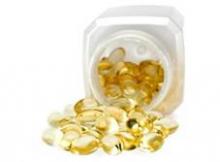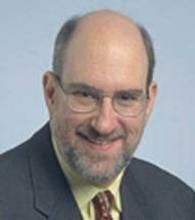SAN FRANCISCO – Healthy middle-aged and older men who take vitamin E supplements have an increased risk of prostate cancer, although the risk takes some time to emerge, suggests an update of the randomized SELECT prevention trial.
At a median follow-up of 7 years – or 1.5 years after the trial had been closed early for futility and men had been told to stop taking supplements – those who had taken vitamin E had a significant 17% greater risk of prostate cancer than those who had taken a placebo. The risk had been increased, although not significantly so, at the time of trial closure.
In absolute terms, the elevated risk from taking vitamin E translated to 11 more cancers for every 1,000 men over a 7-year period, Dr. Eric A. Klein said at the Genitourinary Cancers Symposium.
The findings serve as a cautionary tale, he said. "Nutritional supplements are biologically active and may in fact be harmful, and importantly, the effect may continue after the intervention stops," Dr. Klein commented.
More than half of U.S. men over age 60 take vitamin E, with about one-quarter taking at least 400 IU daily (Ann. Intern. Med. 2005;143:116-20), the dose used in the trial. "Consumers should be skeptical about health claims for unregulated over-the-counter products in the absence of strong evidence of benefit from clinical trials," said Dr. Klein at the meeting, which was sponsored by the American Society for Clinical Oncology, the American Society for Radiation Oncology, and the Society of Urologic Oncology.
In other updated results, men who took selenium with vitamin E and men who took selenium alone did not have any significant increase in the risk of prostate cancer. And baseline plasma levels of various tocopherols (forms of vitamin E) modified prostate cancer risk: Within the vitamin E group, for example, higher levels of alpha-tocopherol were protective, whereas higher levels of gamma-tocopherol were deleterious.
The obvious question now is, how does vitamin E increase prostate cancer risk? said Dr. Klein, who is chairman of the Glickman Urological and Kidney Institute at the Cleveland Clinic. Theories that have been advanced include the possibility that antioxidants become carcinogenic pro-oxidants at high doses; there may be interplay between the different types of tocopherols; high doses of vitamin E may inhibit absorption of other, protective fat-soluble vitamins; and genetic susceptibility may affect the actions of antioxidants. A related, as yet unanswered question is why adding selenium to vitamin E abolishes the excess risk.
"We need to sort all of this out," Dr. Klein said, pointing to the SELECT (Selenium and Vitamin E Cancer Prevention Trial) Biorepository, which contains a wealth of information about the men studied and is being offered as a resource. "I invite anybody in the scientific community to float a hypothesis. If it passes scientific muster, we will give you access to the Biorepository to help us answer [these questions]." More than a half dozen studies have already been approved, he said.
In SELECT, 35,533 healthy North American men aged 50 years or older if black or 55 years or older if of other races/ethnicities who had an average risk of prostate cancer were randomized to four groups: vitamin E (400 IU/day, all rac-alpha-tocopherol acetate), selenium (200 mcg/day from l-selenomethionine), the combination, or a placebo.
"It was recommended, but not required in this trial, unlike in the PCPT [Prostate Cancer Prevention Trial], that men be screened yearly with PSA and digital rectal exam," Dr. Klein noted. "One of the strengths of the trial is that the screening interval and the trigger for biopsy were not prescribed by the trial; they were left to local community standards at these 400-plus sites."
At the time that the trial was halted early, men in the vitamin E group had a marginally increased risk of prostate cancer compared with men in the placebo group (hazard ratio, 1.13; P = .06) (JAMA 2009;301:39-51). But with the additional follow-up, despite cessation of supplement use, the trend continued and became significant (hazard ratio, 1.17; P = .008) (JAMA 2011;306:1549-56).
"There was no difference in tumor aggressiveness across the four arms as assessed by tumor stage and grade," Dr. Klein reported. "And the increased risk of being diagnosed with prostate cancer in the vitamin E arm was not accounted for by more intense screening or an increasing rate of biopsy."



